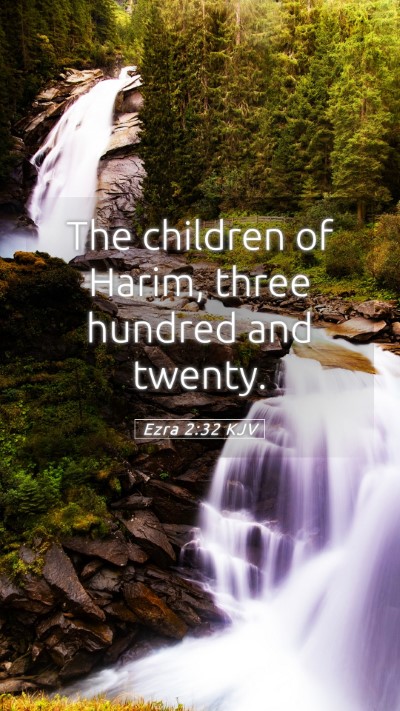Understanding Ezra 2:32: A Comprehensive Bible Verse Commentary
Bible Verse: Ezra 2:32
The verse states, “The children of the other Elam, a thousand two hundred fifty and four.” This simple enumeration carries significant theological and historical implications.
Verse Contextualization
Ezra chapter 2 is primarily focused on the restoration of the Jewish community after the Babylonian exile. This verse contributes to the overall understanding of the demographics of those who returned to Jerusalem, highlighting their identity and hope for restoration.
Verse Meaning and Commentary
In exploring the meaning of this verse, we draw insights from esteemed public domain commentators:
- Matthew Henry's Commentary: Henry emphasizes the importance of the numbers mentioned, suggesting that they not only record the people who returned but also signify the faithfulness of God in keeping His promises. These figures are a testament to the restoration of the Jewish people and their identity as God's chosen nation.
- Albert Barnes' Notes: Barnes points out that the detailed listings in Ezra serve to validate the returnees' heritage. The specific mention of “Elam” reflects the connections to earlier biblical narratives, illustrating God’s unchanging covenant with Israel. He urges readers to see the fulfillment of prophecy; their return marks a pivotal moment in Jewish history.
- Adam Clarke's Commentary: Clarke details that the mention of Elamites shows the diversity within the returning community. He elaborates on the historical context, noting that these families were part of a larger narrative of restoration and divine favor, reinforcing the community's unity.
Scriptural Analysis
This verse is enriched through scriptural cross-references that provide further insight:
- Nehemiah 7:7: This passage echoes the lists found in Ezra, reinforcing the commitment of those who returned.
- Isaiah 11:11: A prophetic backdrop that anticipates the gathering of the remnant of Israel from various nations.
- Ezekiel 48:1-2: Describing the division of land among the tribes, offering a vision of restoration and inheritance.
Application of the Verse
Understanding Ezra 2:32 is essential not only for its historical significance but also for its relevance to modern believers:
- Community and Identity: This verse affirms the importance of community and collective identity in faith. In the same way the ancient Israelites found strength in unity, modern believers are encouraged to foster community in their faith journeys.
- Divine Faithfulness: The very act of returning emphasizes God's faithfulness. It serves as a reminder that God keeps His promises and that believers can trust in His word for restoration and hope.
- Heritage and Legacy: The list of names and numbers calls for an acknowledgment of our spiritual heritage. Believers today can reflect on their legacies and how they fit into the broader narrative of faith.
- Historical Context Awareness: As we explore how to interpret Bible verses like Ezra 2:32, it's vital to consider the historical context and the lives of those mentioned. This enriches our understanding of Scripture and informs our application in daily life.
Conclusion
In summary, Ezra 2:32 goes beyond its numerical representation of a specific group. It captures a moment of restoration and divine assurance for the returning exiles. Through the combined insights of various biblical commentaries, we can glean profound Bible verse meanings and enrich our Bible study insights.
Keywords for Further Study
This analysis taps into essential keywords such as Bible verse meanings, Bible verse interpretations, and Scripture analysis. For those engaged in Bible study groups or seeking Bible study resources, such interpretations aid in the deeper understanding of not just Ezra but the entirety of Scripture.


